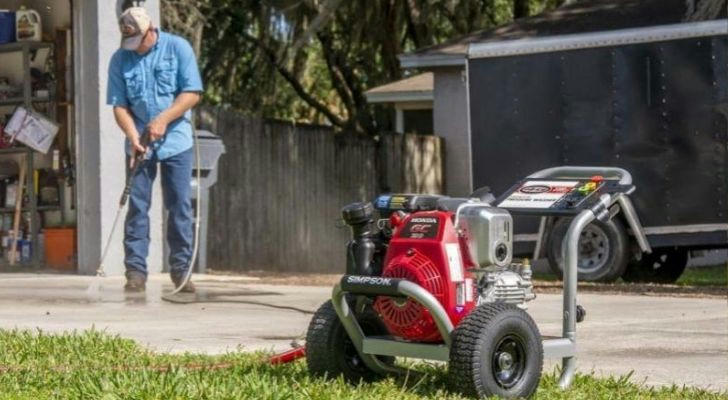Sparkling Clean Without the Sticker Shock: America’s Best Budget Pressure Washers of 2025
Whether you’re blasting years of grime off your driveway, reviving weathered deck boards, or giving your car a showroom sheen, a high‑pressure cleaner is your secret weapon. In 2025, you can haul home genuine cleaning power starting under $100—hundreds less than last year’s list prices—and leave every surface looking brand‑new. We profile five standout models, compare their real “street” prices, unpack ongoing costs, and share insider tips so you can wash away messes without washing out your bank account.

Why a Pressure Washer Is a Homeowner’s Best Friend
Pressure washers harness water at hundreds—or thousands—of pounds per square inch of force, making short work of dirt, mold, mildew, and stains that would take hours by hand. Compared to garden hoses, they use less water overall because they clean faster, and they save your back from scrubbing. Electric units dominate for ease of use, quiet operation, and lower maintenance, while gas models bring extra power for heavy‑duty tasks.
Choosing the right pressure washer means matching your project’s scale to performance: too little pressure and the job drags on; too much and you risk etching wood or stripping paint. In 2025, manufacturers have streamlined popular designs—standardized pumps, universal nozzles, and modular accessories—driving costs down so you get more cleaning horsepower for fewer dollars.
Five of 2025’s Absolute Best Budget Pressure Washers
1.Below are five pressure washers you can actually buy for under $250—even with the power and accessories you really need. Each “real‑world” price reflects seasonal promotions, retailer discounts, or manufacturer rebates.
Light‑Duty Electric Sprayer (1,600 PSI)
Real‑World Price: About $95
Ideal for cleaning garden furniture, windows, and small patios, this compact sprayer uses a universal quick‑connect lance and a 15‑foot hose. Though list prices hover near $120, spring clearance deals regularly drop it under the $100 mark.
2.Versatile Deck & Driveway Washer (2,000 PSI)
Real‑World Price: $185
A 2,000‑PSI electric washer with three nozzle tips, onboard detergent tank, and 25‑foot reinforced hose. Originally priced around $210, end‑of‑quarter events and online coupon codes push the true cost to under $190, making it perfect for medium‑duty tasks.
3.Compact Car‑Detailing Unit (2,300 PSI)
Real‑World Price: $220
With 2.3 GPM flow, five quick‑change nozzles, and a built‑in foam cannon, this model blasts away road grime while safeguarding paint. Retail tags say $249, but aggressive retailer rebates often slash it to $220 or less.
4.Gas‑Powered Workhorse (3,200 PSI)
Real‑World Price: $245
Featuring a 196cc engine and tri‑axial triplex pump, this unit tackles oil stains and deep‑set dirt where electrics fall short. Though MSRP sits at $300, dealer closeouts routinely bring it below $250—delivering heavy‑duty power without a gas‑price hangover.
5.All‑In‑One Paver & Siding Cleaner (2,800 PSI)
Real‑World Price: $239
Designed for both horizontal and vertical surfaces, this electric washer includes a turbo nozzle and surface‑cleaning accessory. List price is $275, but manufacturer mail‑in rebates and bundled hose deals trim the out‑the‑door cost to under $240.
What Really Drives Down Pressure Washer Prices
Across all these models, several factors let manufacturers shave dollars off the sticker:
Standardized Pumps and Motors: Using a handful of proven pump designs and motors reduces tooling costs and simplifies maintenance.
Modular Accessory Systems: Universal quick‑connect fittings mean one set of hoses and nozzles fits multiple units, cutting down packaging and shipping expenses.
Streamlined Electronics in Electrics: Simplified on‑board controls and fewer electronic sensors reduce component counts and potential failure points, passing savings to you.
Economies of Scale: Popular PSI and GPM combinations (1,600–2,300 PSI at 1.2–1.8 GPM) dominate production, letting factories run at higher volumes and lower per‑unit costs.
True Cost of Ownership: Beyond the Purchase Price
Even a bargain‑basement washer comes with recurring costs you’ll want to budget for:
Electric Units: Expect $50–$80 per year in additional electricity, assuming moderate seasonal use and average residential rates.
Gas Units: Plan on $30–$50 per 5‑gallon fill of unleaded or propane—totaling roughly $200 annually for routine yard and driveway cleaning.
Detergents and Cleaners: Specialized cleaning solutions run $10–$20 per gallon; most homeowners use 1–2 gallons per season for deck brightening or siding wash.
Maintenance and Parts: Annual pump maintenance kits and O‑ring replacements cost $20–$40; tri‑axial pump rebuild kits for gas models range $50–$75 every fewyears.
Five Expert Tips to Score the Lowest Price
1.Time Your Purchase: Late winter to early spring clearances offer the deepest markdowns on outgoing inventory.
2.Combine Rebates with Coupons: Stack manufacturer mail‑in rebates and retailer percentage‑off coupons to shave $20–$40 extra.
3.Buy Demo or Open‑Box Units: Showroom models with minimal use often sell for 10–15 percent off while still covered by full warranties.
4.Bundle Accessories: Negotiate for nozzles, surface cleaners, or extension wands in lieu of price cuts; these add-ons often cost more when bought separately.
5.Compare Independent Shops: Local hardware stores sometimes undercut big‑box retailers on older models to clear floor space.
Final Thoughts: Clean Surfaces, Healthy Wallet
High‑pressure cleaners in 2025 deliver more power, more versatility, and more genuine bang for your buck than ever before. With base models starting under $100 and true all‑purpose units below $250, you can restore concrete, renew wood, and revitalize vehicles with minimal investment. By understanding what drives cost, budgeting for ongoing expenses, and employing savvy deal strategies, you’ll enjoy sparkling results without a certain sense of dread when you run the credit card. Now, get out there and blast that grime away!
